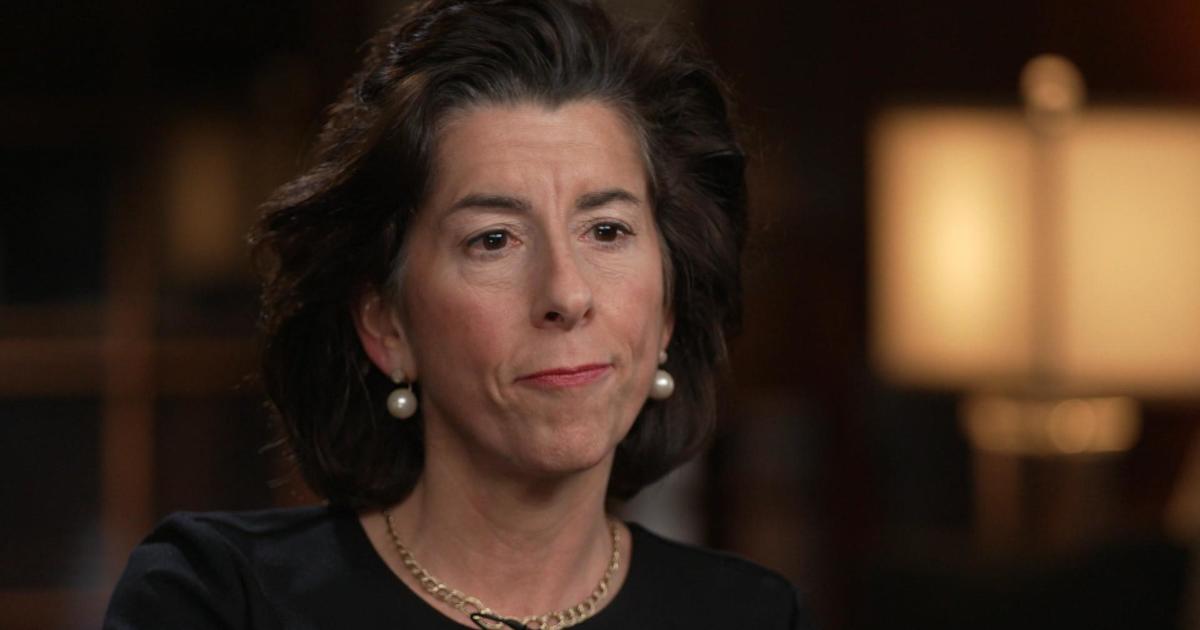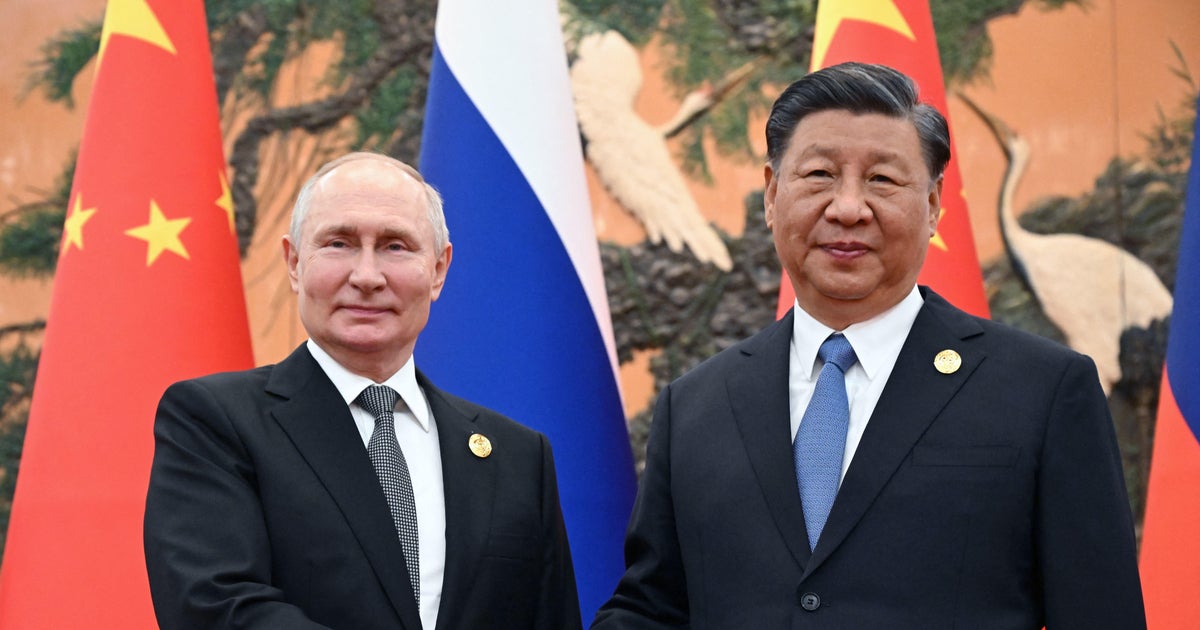CBS News
Commerce Secretary Gina Raimondo on U.S. microchip production, blocking of sales to China, Russia

What does the secretary of commerce do? Until now, mainly promote U.S. businesses abroad. It had not been a high-profile job til Gina Raimondo turned the second-tier agency into a center of job creation, manufacturing, and national security.
Once the governor of Rhode Island, Raimondo, at 52, seems to have come out of nowhere to become a rising star of the Democratic party, and of the Biden administration.
As commerce secretary, she’s running new projects that could touch the lives of every American, and she’s helping lead the expanding Cold War with China and confront Russia’s aggression in Ukraine. The battlefield for both those conflicts is technology.
Gina Raimondo: If you think about national security today in 2024, it’s not just tanks and missiles; it’s technology. It’s semiconductors. It’s AI. It’s drones. And the Commerce Department is at the red-hot center of technology.
And at the red-hot center: a global “chip war” that ramped up, says Gina Raimondo, when Russia invaded Ukraine.
Gina Raimondo: The Commerce Department stopped all semiconductor chips from being sold to Russia. Every drone, every missile, every tank has semiconductors in them. And, you know Lesley, you know we are being effective because shortly after we started that work we heard stories of the Russians taking semiconductors out of refrigerators, out of dishwashers–
60 Minutes
Lesley Stahl: What?
Gina Raimondo: –out, out of breast pumps, getting the chips–
Lesley Stahl: Oh, come–
Gina Raimondo: –to put them into their military equipment.
Lesley Stahl: However, the Russians are now working their way around this–
Gina Raimondo: They are.
Lesley Stahl: –and successfully. And they’re doing better in the war, probably, because of this.
Gina Raimondo: You are right in what you say.
But, she says–
Gina Raimondo: It’s absolutely the case that our export controls have hurt their ability to conduct the war, made it harder. And we are enforcing this every minute of every day, doing everything we can.
60 Minutes
These are some of the enforcers:
Thea Kendler (assistant secretary of commerce for Export Administration):Push to talk about our controls on Russia–
–Raimondo’s team at Commerce that monitors and polices the ban on any company in the world from selling products with American chips in them to Russia. but not just Russia.
President Biden (during State of the Union): I’ve made sure that the most advanced American technologies can’t be used in China.
The Chinese warn that these export controls could trigger an escalating trade war.
Lesley Stahl: Trade with China accounts for 750,000 U.S. jobs.
Gina Raimondo: Mmhmm.
Lesley Stahl: And if trade ends, we lose those jobs.
Gina Raimondo: We want to trade with China on the vast majority of goods and services. But on those technologies that affect our national security, no.
Lesley Stahl: Those advanced chips are in consumer goods. Banks use them—
Gina Raimondo: Mmhmm.
Lesley Stahl: –hospitals. This is going toward products that are made for civilian use.
Gina Raimondo: Yep. Well, they also go into nuclear weapons, surveillance systems. And we know they want these chips and our sophisticated technology to advance their military.
Her toughness has made her a target in China, where fake ads have her promoting the new Chinese-made smartphone.
Last year, the government in Beijing hacked her email. When she was in China, on a trip ironically to improve relations, the tech company Huawei introduced that new smartphone with an advanced, Chinese-made chip.
Lesley Stahl: It was kind of in your face—
Gina Raimondo: Mmhmm.
Lesley Stahl: –as if to say, “Look at the chip that we have.” And it was a pretty good, high-level chip, right?
Gina Raimondo: Well, I have their attention, clearly. And–
Lesley Stahl: And they’ve gotten yours.
60 Minutes
Gina Raimondo: Hmm. Well, what it tells me is the export controls are working because that chip is not nearly as good–
Lesley Stahl: It’s not?
Gina Raimondo: –it’s years behind what we have in the United States. We have the most sophisticated semiconductors in the world. China doesn’t. We’ve out-innovated China.
Lesley Stahl: Well, “we,” you mean Taiwan?
Gina Raimondo: Fair.
While American tech companies design the world’s most advanced chips, none are actually made in the U.S. Ninety percent of them come from Taiwan, and they are key to the future of U.S. military weaponry.
Lesley Stahl: And China, from time to time, threatens, you know, the wolf, to invade Taiwan.
Gina Raimondo: Mmhmm.
Lesley Stahl: And some people say the whole reason is to get their hands on those chips.
Gina Raimondo: That’s a problem, it’s a risk, it makes us vulnerable.
The problem of our outsourcing production goes way beyond high tech with millions of American workers having lost their jobs that went overseas, something Raimondo knows first-hand growing up as the youngest child in an Italian-American family in Rhode Island.
Gina Raimondo: This is the old Bulova watch factory where my dad worked for almost 30 years.
Her dad lost his job when Bulova abandoned the factory in 1983 and moved its operations to China.
Gina Raimondo: It’s hard for you to imagine it now as you look around here. But this was, you know, a bustling place. You know, they had 1,000 people working here, food trucks on the sidewalk, an electroplating shop there, a tool and dye shop there. And now, this is what you have.
Lesley Stahl: And how old were you?
Gina Raimondo: I was in, like, sixth grade. But I saw the toll it took on my dad and my family.
And that influenced her career choices from when she studied economics and played rugby at Harvard–
Gina Raimondo: So, this is my office.
–to when she left a high-paying job as a venture capitalist to run for public office in Rhode Island.
Gina Raimondo: This was the day that I was sworn in as State Treasurer, and those are my parents. That’s my dad.
Lesley Stahl: That’s your dad–
Gina Raimondo: Super proud of me.
Lesley Stahl: –the man who worked at Bulova.
Gina Raimondo: The man who worked at Bulova. The man who taught me about manufacturing, tau– taught me that a job is about your pride, ability to take care of your family, not just a paycheck.
Married with two children, Raimondo–a Rhodes scholar and Yale Law School graduate–was elected the state’s first female governor in 2014 as a moderate, pro-business Democrat.
Lesley Stahl: Liberals in your party, this is a quote, look upon you as a sellout to big business.
Gina Raimondo: I think that’s ridiculous. I hold businesses accountable as much as anyone. When I tell them they can’t sell their semiconductors to China, they don’t love that. But I do that.
In late 2020, President-elect Joe Biden called her about leading the Commerce Department, which til then managed–without much fanfare or headlines–a mishmash of agencies and assignments, ranging from monitoring the weather to measuring the level of contaminants in household dust.
Lesley Stahl: So, one day, President-elect Biden calls you and said, “What about being Commerce Secretary?” And you heard that and thought?
Gina Raimondo: (laugh) Init– truthfully, initially, I thought, “What does the Commerce Secretary do?”
Lesley Stahl: Yeah. (laugh)
Gina Raimondo: And then the president-elect said to me, “Come. I want you to work with me to help rebuild American manufacturing.” And I called my brother, my big brother, and he said, “Gina, dad would be so proud. You gotta do it. You gotta do it.” And that was it.
Once at Commerce, she began to lean on Congress-
Gina Raimondo (during congressional testimony): This is just good business–
–to fund her new programs with $100 billion, including $50 billion for the bipartisan “CHIPS Act” that she is now dispensing to reduce America’s reliance on Taiwan.
Gina Raimondo (during Intel “CHIPS Act” award announcement): It’s a huge day for the entire country.
Last month in Arizona, she announced her first award for making leading-edge chips in the U.S. to Intel.
Gina Raimondo (during Intel “CHIPS Act” award announcement): We are announcing our intention to invest $8.5 billion in Intel, America’s champion semiconductor company. (applause)
Intel intends to construct and modernize facilities in Arizona, New Mexico, Oregon, and Ohio.
She’s made two other big awards totaling $13 billion to Taiwan-based TSMC, and the South Korean company Samsung, to make the world’s most advanced chips in Arizona and Texas.
Raimondo is also spreading her largesse elsewhere in the country with another huge initiative, the “Internet For All” program.
60 Minutes
We went with her to a Corning factory in North Carolina, the world’s largest manufacturer of fiber optic cable.
Wendell Weeks: You’re looking at fiber on these spools, all different colors. What’s inside of there is actually one of the most precise products ever manufactured by man.
Wendell Weeks, chairman and CEO of Corning, is expanding production to make some of the 10 million miles of new cable that’s needed to connect the 24 million Americans, living mostly in rural America, who don’t have access to high-speed internet. And under prodding by Raimondo, he’s investing Corning’s own capital to do it.
Wendell Weeks: We’ve invested another half-billion dollars and doubled our footprint for the U.S.
Lesley Stahl: When you’re spending all this money to connect, you know, small numbers of people who live miles away, the expense almost doesn’t make sense.
Gina Raimondo: It does make sense. The internet is no longer a luxury. You need it to see the doctor, to go to school, to do your business, to pay your bills, to sign up for, you know, Social Security. Everyone has electricity in this country. Everyone ought to have the internet.
Together, she says, the Internet For All and the CHIPS Act initiatives will create about a half-million jobs by 2030. But Wall Street is skeptical. Intel, for example, just reported $7 billion in operating losses.
Lesley Stahl: When you go to pick these different companies to give the money to–
Gina Raimondo: Mmhmm.
Lesley Stahl: –it’s, it’s social, industrial policy, something, you know, we gave up because it was shown that private industry does a better job picking. You’re smiling.
Gina Raimondo: Well, do they? Because in the case of semiconductors the market didn’t get it right.
Lesley Stahl: How did we lose this?
Gina Raimondo: We allowed manufacturing in this country to wither on the vine in search of cheaper labor in Asia, cheaper capital in Asia, and here we are. We just pursued profit over national security.
Lesley Stahl: There are strings attached to these grants. They have to provide daycare. You want them to have a diverse workforce–
Gina Raimondo: Mmhmm.
Lesley Stahl: –be union workers?
Gina Raimondo: That is not social policy, Lesley. That’s–
Lesley Stahl: Sounds like it.
Gina Raimondo: –it’s math. This is pure math.
Lesley Stahl: What do you–
Gina Raimondo: You won’t have enough workers to do the job unless you figure out how to get women working in the facilities. What I am–
Lesley Stahl: But– but on that point, if they need women–
Gina Raimondo: Mmhmm.
Lesley Stahl: –and women need daycare, that’s a decision for the company to make. Why mandate it if it’s what they need?
Gina Raimondo: It’s not mandated. To be clear, these are not mandates.
Lesley Stahl: But it’s written in there.
Gina Raimondo: It is written. But you know what’s funny, I never hear complaints about this from the companies. The only complaints I have are from politicians.
In her three years in Washington, Raimondo has elevated the Commerce Department and its secretary into a high-profile player.
Gina Raimondo: China wakes up every day figuring out how to get around our regulations. We got to wake up every day that much more relentless and aggressive. So, I bring it every day.
Lesley Stahl: So here comes the inevitable, obvious question that you know is coming your way. You are on a list of future presidential candidates. Does that sound good to you? Is it appetizing?
Gina Raimondo: What sounds good to me is being the best commerce secretary there’s ever been.
One qualification for high office is being able to duck a question like that.
Produced by Richard Bonin. Associate producer, Mirella Brussani. Broadcast associate, Wren Woodson and Aria Een. Edited by April Wilson.
CBS News
Social Security Fairness Act clears key Senate hurdle, heads to final vote

Legislation to expand Social Security benefits to millions of Americans cleared a key hurdle in the U.S. Senate on Wednesday afternoon and is now headed toward a final vote.
Senators voted 73-27 to approve a motion to proceed with consideration of the Social Security Fairness Act, according to an unofficial Senate tally shown in a webcast on the floor of the chamber.
“We will vote on taking up the Social Security Fairness Act to repeal flawed policies that eat away at the benefits of those who’ve worked as teachers, firefighters, postal workers, or public sector workers,” Senate Majority Leader Chuck Schumer said on social media shortly before the procedural vote. “Retirees deprived of their hard-earned benefits will be watching closely.”
The New York Democrat has pushed to bring the measure up for a full vote, which would eliminate two federal policies that prevent million of Americans, including police officers, firefighters, postal workers, teachers and others with a public pension from collecting their full Social Security benefits.
“Social Security is a bedrock of our middle class. You pay into it for 40 quarters, you earned it, it should be there when you retire,” Ohio Senator Sherrod Brown, a Democrat who lost his seat in the November election, told the chamber ahead of Wednesday’s vote. “All these workers are asking for is for what they earned.”
Sen. Thom Tillis spoke against measure, saying that while a small percentage of people are not getting what they should from Social Security, enacting what he framed as an unfunded government mandate that would increase the federal deficit “is not the way to fix it.”
“This bill will take $200 billion during the 10-year period out of the Social Security trust fund without any way to pay for it,” the North Carolina Republican added.
What is the Social Security Fairness Act?
Decades in the making, the Social Security Fairness Act would repeal two federal policies — the Windfall Elimination Provision (WEP) and the Government Pension Offset (GPO) — that broadly reduce payments to nearly 3 million retirees.
That includes those who also collect pensions from state and federal jobs that aren’t covered by Social Security, including teachers, police officers and U.S. postal workers. The bill would also end a second provision that reduces Social Security benefits for those workers’ surviving spouses and family members. The WEP impacts about 2 million Social Security beneficiaries and the GPO nearly 800,000 retirees.
“This stuff takes time, but 21 years is ridiculous,” said Brown of the process. The Senate held its first hearings into the policies in 2003.
The measure, which passed the House in November, had 62 cosponsors when it was introduced in the Senate last year. Yet the bill’s bipartisan support eroded some in recent days, with some Republican lawmakers voicing doubts due to its cost. According to the Congressional Budget Office, the proposed legislation would add a projected $195 billion to federal deficits over a decade.
At least one GOP senator who signed onto similar legislation last year, Sen. Mike Braun of Indiana, said he was still “weighing” whether to vote for the bill. “Nothing ever gets paid for, so it’s further indebtedness, I don’t know,” Braun said last week, the Associated Press reported.
“In the end it’s going to come down to individual members are going to make their own decisions about where they want to come down on that,” incoming Republican leader John Thune said at a press conference Tuesday. “Obviously I am concerned about the long-term solvency of Social Security and that is an issue I think we need to address.”
Without Senate approval, the bill’s fate would end with the current session of Congress, and would need to be re-introduced in the next Congress.
CBS News
Behind the House Ethics decision to release the Matt Gaetz misconduct report

Watch CBS News
Be the first to know
Get browser notifications for breaking news, live events, and exclusive reporting.
CBS News
Seeking a motive in the Madison school shooting case

Watch CBS News
Be the first to know
Get browser notifications for breaking news, live events, and exclusive reporting.











